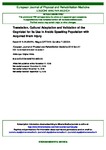Translation, cultural adaptation and validation of the cognistat for its use in Arabic speaking population with acquired brain injury.
Date
2018-11-21Author
Subject
Metadata
Show full item recordAbstract
BACKGROUND: The use of cognitive assessment tools is central to the detection of cognitive impairment in acquired brain injury patients. The Cognistat is a commonly used cognitive screening tool that can detect cognitive deficits among patients with neurological and psychiatric conditions. The Cognistat examines different major ability areas including level of language, construction, memory, calculation, reasoning, consciousness, orientation and attention. To date the Cognistat has not been translated/adapted for use in Arabic speaking countries. AIM: To provide normative data for the use of the Cognistat in Arabic-speaking populations with acquired brain injury. DESIGN: Cross-cultural validation study. SETTING: Inpatient TBI and stroke rehabilitation ward in a rehabilitation hospital. POPULATION: A total of 107 healthy Arabic speaking adults and 62 acquired brain injury patients were involved in the study. METHODS: After the completion of the cross-cultural adaptation process, psychometric properties of the adapted cognitive tool were evaluated. RESULTS: The Arabic Cognistat was found to have acceptable internal consistency, and the test-retest reliability showed high stability of scores over time. For concurrent validity, patients' performance on the Arabic Cognistat and the Mini-Mental State Examination were compared with excellent correlations overall. Significant differences between the performance of patients and the control group were found on all sub-tests. CONCLUSIONS: The Arabic Cognistat appears to be a valid and reliable cognitive screening tool. It is anticipated that the Arabic Cognistat will be widely used in the Arabic speaking countries, allowing for a very precise evaluation of cognitive deficits in acquired brain injury patients. CLINICAL REHABILITATION IMPACT: As part of the rehabilitation process, health care professionals are regularly required to test patients' cognitive abilities using appropriate measures. The findings of the study provide key solutions for the clinical assessment of Arabic populations: such cognitive tools could help improve the cognitive rehabilitation practice for the Arabic population by offering validated, reliable and culturally-adapted tests in the Arabic language.
Description
Collections
Publisher
Place of Publication
Journal
Volume
Issue
Pagination
Author URL
Recommended, similar items
The following license files are associated with this item:



